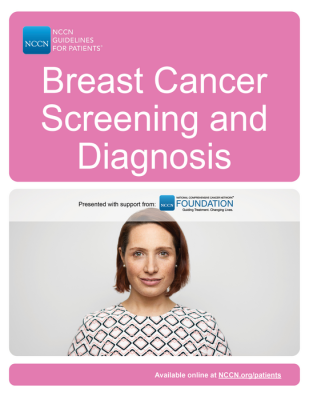
NCCN Guidelines for Patients: Breast Cancer Screening and Diagnosis. Image courtesy of NCCN
July 28, 2022 — The National Comprehensive Cancer Network (NCCN) has published new NCCN Guidelines for Patients: Breast Cancer Screening and Diagnosis to help people understand their personal risk for breast cancer, when they should begin screening, and how often to screen—in order to detect cancer earlier, for more treatment options and better outcomes. With this information, they are equipped to have more informed conversations with their health care providers and be active decision-makers in their long-term health.
The breast cancer screening guidelines are the latest in NCCN’s library of NCCN Guidelines for Patients, published through funding from the NCCN Foundation® and available for free at NCCN.org/patientguidelines and via the NCCN Patient Guides for Cancer App. NCCN Guidelines for Patients provide information on nearly 60 cancer types, as well as topics such as treatment side effects, distress management, and survivorship.
“There are many, often conflicting, recommendations surrounding breast cancer screening, which causes a lot of confusion and apprehension,” said Therese Bevers, M.D., Professor of Clinical Cancer Prevention, The University of Texas MD Anderson Cancer Center; Chair, NCCN Guidelines Panel for Breast Cancer Screening and Diagnosis. “These are the latest, evidence-based guidelines from experts in the field of breast cancer screening and diagnosis from more than two dozen leading cancer centers in the United States.”
“Everyone with breasts carries some risk of breast cancer, so the key is to know your risk,” said Dr. Bevers. “Most women with average risk should get screened every year, beginning at age 40, but if there are additional risk factors present, a provider might recommend an earlier start.” According to the guidelines, women should undergo a risk assessment for developing breast cancer starting at age 25. Increased risk is based on a number of factors including age and family history of certain cancers—including ovarian and pancreatic cancer, not just breast cancer.
And regular screening and breast exams are safe and important for those who are pregnant or breastfeeding, Dr. Bevers added. “A lot of women think they need to put this on hold, but we can shield the belly, and the radiation is very low dose and targeted. It’s important to keep up with screenings. Especially for women whose first pregnancy is happening when they are 40 or older.”
“Annual mammography screening beginning at age 40 is associated with the highest mortality reduction for average risk women,” said Mark Helvie, MD, Professor, Active Emeritus, Department of Radiology, University of Michigan; Member, NCCN Guidelines Panel for Breast Cancer Screening and Diagnosis. “Regular screening and breast exams help find breast cancer at its earliest, most treatable stages. Having a mammogram at infrequent or irregular intervals limits its effectiveness. For women at increased risk, the NCCN Guidelines recommend starting screening earlier and often include breast MRI in addition to mammography.”
The NCCN Guidelines for Patients: Breast Cancer Screening and Diagnosis also addresses the appropriate evaluation of breast symptoms most-commonly seen as a palpable lump, pain, or nipple discharge—though anything at all unusual with the breasts should be discussed with a doctor. Cancer symptoms can be similar to symptoms from benign causes and they can also occur in unique ways. Therefore, if a provider or patient discovers anything out of the ordinary, the NCCN Guidelines recommend a prompt clinical and diagnostic check with imaging and, in some cases, biopsy to determine the correct diagnosis.
“These guidelines will help so many people,” said Sue Friedman, DVM, Executive Director, Facing Our Risk of Cancer Empowered. “There is general confusion about breast cancer screening guidelines and what screening people should follow based on their risk. NCCN patient guidelines are an easy way for people to access up-to-date expert recommendations in plain language.”
NCCN Guidelines for Patients are based on the NCCN Clinical Practice Guidelines in Oncology (NCCN Guidelines), which are updated frequently by multidisciplinary teams of experts from across NCCN Member Institutions. The patient versions present unbiased expert guidance in an easy-to-read format—with clear language, charts, images, and a glossary of medical terms.
For more information: https://www.nccn.org/


 December 08, 2025
December 08, 2025 








